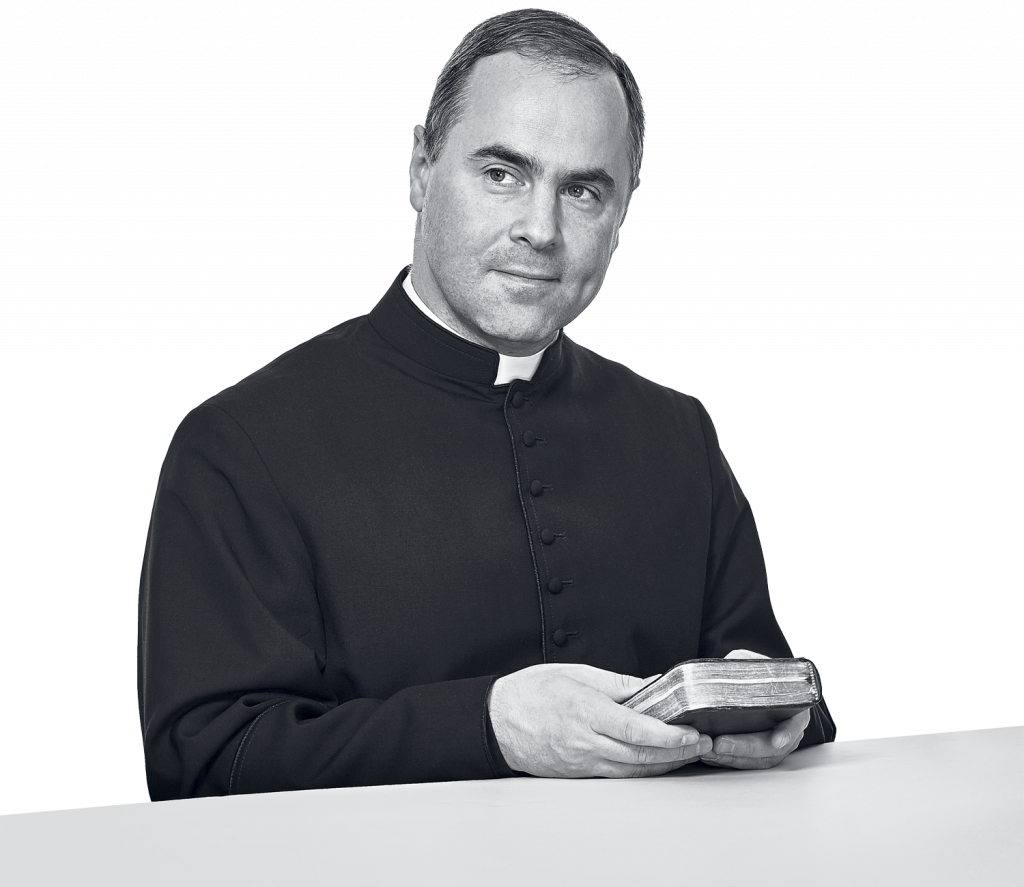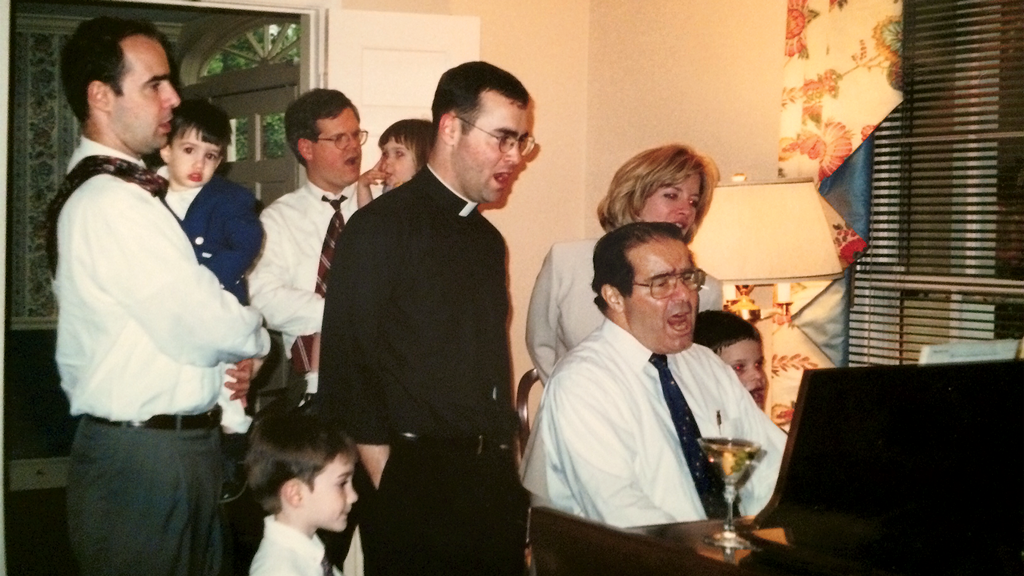Antonin Scalia’s Catholic Priest Son Doesn’t Like Being Called a Conservative

Paul Scalia was a teenager when his father, the late Antonin Scalia, was appointed to the Supreme Court by President Ronald Reagan in 1986. By then, the younger Scalia had already begun to feel a pull toward the Catholic priesthood. A decade later, he would be ordained at St. Catherine’s, his family’s parish in Great Falls. He has served in the Diocese of Arlington ever since.
But following his eloquent homily at his father’s funeral Mass last year, Father Scalia has become more visible. He was recently named vicar for clergy by Arlington’s new bishop, and in March a collection of Father Scalia’s writing on his faith, That Nothing May Be Lost, was published by Ignatius Press. We talked with him about growing up Catholic—and growing up Scalia.
In the book, you say your father’s passing gave you a new realization of the gift of his faith. How so?
Well, first of all, in the outpouring of prayers, Mass cards, and condolences that came from Catholics and Christians and people of other faiths from throughout the world, because they knew him to be a man of faith, and not necessarily their own faith. You take it for granted growing up—that’s Dad, and we go to Mass because that’s what we do—but his faith had an impact that I had not perceived. It makes me value more deeply the things he communicated.
I don’t think my siblings and I have been so grateful for each other as in the weeks and months after his death. We were right there for one another, with a sense of that faith.
You told a great story at your father’s funeral about his accidentally entering your confessional line at church and bolting when he realized where he was. How often did he attend your church?
I was assigned to St. John the Beloved in McLean for just over four years, and soon after I arrived, he started coming. He’d be there every Sunday when he wasn’t traveling. I’d like to think it had to do with me, too, but it had a lot to with the traditional Latin Mass we offered.
Do you feel like you had any influence on him?
I don’t have any indications of that. [Laughs.] Shortly before he died, we revisited an old argument about the difference between a homily and a sermon. He didn’t like the word homily, typically a commentary on Scripture. He preferred the word sermon, which is a talk on faith or dogma. I like to think I brought him along a little.

When did you break it to your parents that you were going to be a priest?
[Laughs.] Break it to them! It’s not like they were disappointed. I was going into my senior year at the College of the Holy Cross. It was uneventful because they saw it before I did.
I guess it was easier when Catholic families had nine children, as yours did.
Right, one less wedding! But you’re right—it’s an openness to life that my parents clearly lived. When it comes to artificially limiting family size, many families are going to hold back on nourishing a vocation. They’ll say, “Gosh, I want my son or daughter to have a family.”
So much has changed for Catholics—the expectation that you were going to marry in the church, that you’d attend Mass weekly.
Those changes are more prevalent in the Northeast Catholic centers. It’s only in the last 30 or 40 years that the Church has boomed in Northern Virginia. There wasn’t the institutional structure. We have some high schools, but we have no hospitals, no nursing homes, so the culture is not what it is in other places. So if you’re going to be Catholic, you have to be more deliberate about it. You have to choose it. I think that’s a blessing. You don’t want a culture that enables people to take faith for granted. You want a culture that elicits from you a personal commitment to be Catholic and not just lets you coast.
You talk about the boom, though. That has changed the Church here.
Right, the biggest change that I’ve seen is the change that anyone here sees, which is growth. There’s been an enormous increase in the Hispanic population. Some parishes are now half Hispanic. But it’s not only the Hispanics. We have a Vietnamese parish, a Korean parish. We have an Eritrean community, a Ghanaian community. We’ve got all of these groups who have come to the area over the years. That’s the most significant change.
The Diocese of Arlington has a reputation of being rather conservative. Was that true as long as you can remember?
I don’t like the term conservative. That’s a political category. I guess you could say traditional, but then every Catholic is traditional, or ought to be, because we have to be rooted in the tradition of the Church. So I don’t like those categories, because it sounds like tradition is an option. It feeds into stereotypes. The fact of the matter is that if you’re adhering to the Church’s teachings, there’s always going to be someone who thinks you are too traditional or not traditional enough.
How old were you when your father was appointed to the Supreme Court?
I was 15. You have to understand, this was before the court took on the enormous role it has now in public life. I think my father would be the first to say that it should not have the enormous role it has now, that it’s a distortion of its purpose. The court should have a more modest role. When he was appointed in ’86, I was in high school with the children of senators and congressmen and governors, and they were the better-known names. Later, the name got to be better known, but it wasn’t a big deal. He was dad, and the lawn better be mowed and you’d better not be late for dinner.
He seemed to have a strong influence on you, particularly in your writing.
That wasn’t consciously from my dad. It was just as much my mom. She’s a very well-read woman and is always reading.
You’ve written as long as you’ve been a priest.
I actually started writing in college, where I started a newspaper, the Fenwick Review. It was to get some good discussion going on campus about things, focused on the faith, to discuss it and write about and get into those issues.
You’ve broken out of the usual places you’d find a parish priest’s writing. You’ve contributed to national publications like First Things. When did you make that leap?
[First Things founder] Father Richard John Neuhaus had seen a letter to the editor I’d written, and he asked me to write for him. His book The Catholic Moment had a strong effect on me in college in terms of my vocation to the priesthood.
Your book is beautiful and very devout, and your pieces are introduced by some big names—an archbishop and some prominent theologians.
They were people I know well personally and those who have had some influence on me. Mary Ellen Bork, the widow of Judge Robert Bork, was a parishioner in McLean and a friend of the family.
I wonder if, since your father’s passing, people are looking to you to say more. Do you feel the need to address bigger topics?
Faith is a big enough topic.
Yet you gave a speech last fall commemorating your father, in which you had some things to say about our national life, voicing concerns about government intrusion into our private lives.
Faith is not disconnected from that. If we speak about faith, we have to talk about the public living of it. It can never be a private matter. It always has to be lived out in the public square.
This has been a discussion since the ’80s—how much to bring religion into the public square.
This has been a discussion since the Pharisees, since Our Lord said, “Give to Caesar what is Caesar’s and give to God what is God’s.” Saint Ambrose addressed this with the emperor; Thomas More addressed this with Henry VIII. What are the lines, and what are the limits?
The role of the Church is to inform the conscience, not to draft legislation. But we have a right to live out our faith publicly. It can’t be confined to the Church or school—thus far, no further. That doesn’t comport with our human freedom.
Whether or not you feel the need, do you think eyes are upon you? Do you think there’s an expectation that you’ll speak out on the topics that Father Neuhaus did? Even your father started to talk more openly toward the end of his life about faith and the country.
I don’t feel that. My purpose is for the care of souls. My concern is for the care of souls as a priest. That may step into the national conversation, but that’s only in pursuit of the care of souls. That’s not an end in itself. There are plenty of people who do that, and it’s fine, but as a priest my concern is not to be a cultural commentator or an observer of the national scene.
What is your hope for the book?
I hope that for those Catholics who read it, their faith will be renewed and deepened. And I hope any non-Catholics read it and become intrigued by the faith, look into the faith, and come to it. That would be wonderful.
This article appears in the May 2017 issue
5 comments:
Wow! just Wow! Springtime! where do I find the book?
You have to go against the grain in that part of Virginia, which unfortunately has become very liberal over time (migration from up North). Clinton won Northern Virginia 2-1 over Trump, which goes a long way to explaining Virginia's transformation in the last generation from solidly GOP for president to at best (for Republicans) politically marginal, if not trending Democratic. The Richmond diocese in that state had a much more liberal reputation under the late Walter Sullivan, but has moved in a more conservative direction with his successor. Virginia was the only southern state to back Clinton last November, and to back Obama in both 2008 and 2012.
In this time of the Church where the new enablization is in full force the headline should be that a Catholic priest actually seeks to convert non Catholics to the One True Faith.
Gotta love the headline though lol.....typical liberal childish behavior.
"When did you break it to your parents that you were going to be a priest?"
Sounds odd to anyone who remembers when it was assumed implicitly that every Catholic mother prayed for her son to become a priest.
Henry
That was back when every mother and father had more than one son and daughter, the real reason for the decline in vocations is small families, personal experience here, I had three sons,and two daughters, the eldest son is mildly retarded, long story, my two youngest were also boys, i had hoped for a vocation, youngest tragically died in a farm accident at the age of three (which I will bare till i die, some days it still damn near kills me with sorrow and sever depression, it's been 16 years now), after that happened I prayed the the one left would take over the farm and take care of his brother with problems, (he is ) I guess I sort of feel God already has one
Post a Comment